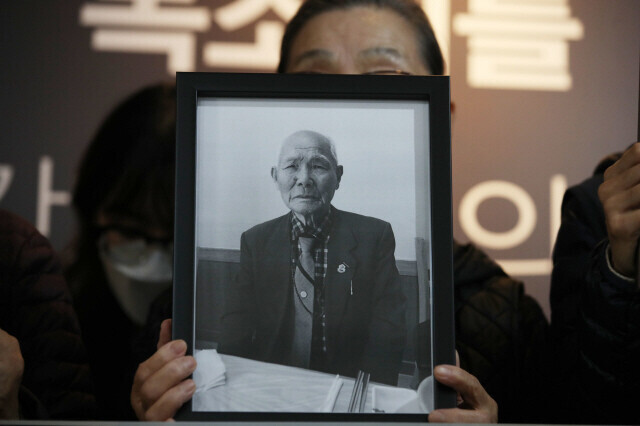hankyoreh
Links to other country sites 다른 나라 사이트 링크
Seoul’s new joint body on forced labor by Japan will not include victims’ groups

The South Korean government has moved to establish a joint public-private body in order to address the issue of compensation for Korean victims of forced labor during the Japanese colonial period, one of the reasons South Korea-Japan relations are currently at a stalemate.
Observers say South Korea should not make a one-sided compromise without corresponding measures from Japan.
According to sources familiar with the situation, as of Monday, the South Korean Ministry of Foreign Affairs has decided to establish and operate a public-private cooperative body so that scholars and other experts can come together to come up with specific solutions to resolve the issue of compensation for Korean victims of forced labor at the hands of the Japanese colonial government. The organization will be formed within the month, after which intensive discussions will take place within a short period so as to quickly devise a solution.
Though the government will proactively communicate with victim support organizations during internal discussions within the organization in principle, it will most likely not directly include them in the cooperative organization.
Recently, Foreign Ministry officials contacted victim support groups and victims’ representatives in Seoul and Gwangju, but they did not mention anything about the government’s plan to form a joint organization regarding the issue during their communication.
The South Korean government is taking the initiative to resolve the issue of compensation for victims of forced labor during the Japanese colonial period because Japan has repeatedly insisted on its settlement as a precondition for improving ties between South Korea and Japan.
Since the South Korean Supreme Court ruled in October 2018 that victims of forced labor during the Japanese colonial period should be compensated, the Japanese government has refused to participate in relevant discussions, arguing that the issue was “resolved by the 1965 Claims Settlement Agreement” and that “the South Korean Supreme Court’s ruling violates international law.”
The fact that a Supreme Court ruling is imminent for the case involving Mitsubishi and other Japanese companies that committed war crimes and were ordered to sell their assets for liquidation purposes may be another reason the South Korean government is rushing to take action to tackle the issue.
While acknowledging that “making efforts to come up with a solution in whatever shape or form is a positive thing,” victim support groups and civil society members pointed out that “our side shouldn’t be so easily swayed and obsess over making diplomatic achievements like having a summit when Japan hasn’t demonstrated a change of attitude or taken corresponding measures.”
“Compensation is a victim’s legitimate right and an issue directly connected to judicial sovereignty, not an object of political bargaining or transaction,” said Kim Young-hwan, the head of outreach at the Center for Historical Truth and Justice.
By Jung In-hwan, staff reporter
Please direct questions or comments to [english@hani.co.kr]

Editorial・opinion
![[Column] Season 2 of special prosecutor probe may be coming to Korea soon [Column] Season 2 of special prosecutor probe may be coming to Korea soon](https://flexible.img.hani.co.kr/flexible/normal/500/300/imgdb/original/2024/0426/3317141030699447.jpg) [Column] Season 2 of special prosecutor probe may be coming to Korea soon
[Column] Season 2 of special prosecutor probe may be coming to Korea soon![[Column] Park Geun-hye déjà vu in Yoon Suk-yeol [Column] Park Geun-hye déjà vu in Yoon Suk-yeol](https://flexible.img.hani.co.kr/flexible/normal/500/300/imgdb/original/2024/0424/651713945113788.jpg) [Column] Park Geun-hye déjà vu in Yoon Suk-yeol
[Column] Park Geun-hye déjà vu in Yoon Suk-yeol- [Editorial] New weight of N. Korea’s nuclear threats makes dialogue all the more urgent
- [Guest essay] The real reason Korea’s new right wants to dub Rhee a founding father
- [Column] ‘Choson’: Is it time we start referring to N. Korea in its own terms?
- [Editorial] Japan’s rewriting of history with Korea has gone too far
- [Column] The president’s questionable capacity for dialogue
- [Column] Are chaebol firms just pizza pies for families to divvy up as they please?
- [Column] Has Korea, too, crossed the Rubicon on China?
- [Correspondent’s column] In Japan’s alliance with US, echoes of its past alliances with UK
Most viewed articles
- 1‘We must say no’: Seoul defense chief on Korean, USFK involvement in hypothetical Taiwan crisis
- 2[Column] Season 2 of special prosecutor probe may be coming to Korea soon
- 3N. Korean delegation’s trip to Iran shows how Pyongyang is leveraging ties with Moscow
- 4Korea sees more deaths than births for 52nd consecutive month in February
- 5Amnesty notes ‘erosion’ of freedom of expression in Korea in annual human rights report
- 6[Reportage] On US campuses, student risk arrest as they call for divestment from Israel
- 7[Editorial] New weight of N. Korea’s nuclear threats makes dialogue all the more urgent
- 8‘Weddingflation’ breaks the bank for Korean couples-to-be
- 9[Column] Has Korea, too, crossed the Rubicon on China?
- 10[Column] Park Geun-hye déjà vu in Yoon Suk-yeol